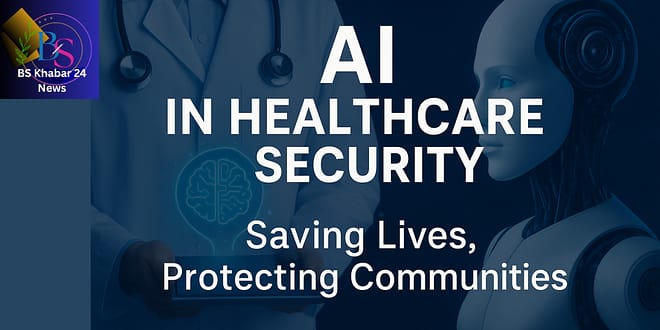AI for Healthcare and Security: Transforming Lives and Protecting the Future
“AI for Healthcare and Security: How Artificial Intelligence is Saving Lives and Protecting Communities”
Artificial Intelligence (AI) has quickly evolved from a trendy term to a necessary component of contemporary life. AI for Healthcare and security are two sectors where AI is having the greatest influence. AI is influencing how societies operate in 2025, from early sickness diagnosis to cyber threat defence for cities. Let’s examine how AI is enhancing these two important fields in more detail.
AI in Healthcare: Smarter, Faster, and More Accurate
Innovation has always been a key component of healthcare, but AI is revolutionising the field. AI-driven technologies are currently being used by medical professionals and hospitals worldwide to enhance patient care, lower expenses, and save lives.
Early Diagnosis and Detection
One of the biggest challenges in medicine is identifying diseases early. AI-powered imaging systems can now scan X-rays, MRIs, and CT scans with remarkable accuracy. For example, AI tools can detect signs of cancer, heart disease, or neurological disorders earlier than traditional methods. This means patients get treatment faster, which often leads to better recovery.
Personalized Treatment
Since each patient is different, AI is assisting medical professionals in creating individualised treatment programs. AI can forecast a patient’s reaction to a particular medication or treatment by using vast volumes of patient data. This raises the likelihood of success and decreases the need for trial-and-error therapies.
Virtual Health Assistants
Imagine carrying a medical companion with you at all times on your phone. Virtual assistants and AI chatbots are now assisting patients with appointment scheduling, prescription management, and health-related enquiries. AI for Healthcare and Security and These AI systems are filling the gap in remote locations where access to doctors may be limited.
Robotic Surgeries and Smart Hospitals
Robotic systems driven by AI are helping surgeons carry out intricate operations with extreme precision. By anticipating patient arrivals, allocating resources, and even cutting down on wait times, intelligent hospital management systems are also increasing productivity.
With these developments, AI is assisting physicians in making quicker, safer, and better-informed decisions rather than taking their place.
AI for healthcare and Security: Safeguarding People and Systems
While healthcare focuses on saving lives, security is about protecting them. AI is emerging as a crucial ally in global security, from monitoring public areas to thwarting cyberattacks.
Cybersecurity and Threat Detection
Cyber risks are rapidly growing in today’s digital world. Hackers employ sophisticated tools, but AI is retaliating by instantly spotting odd activity. Cybersecurity systems driven by AI are able to identify malware, phishing emails, and hacking attempts more quickly than human analysts.
2.Public Safety and Surveillance
Airports, train stations, and congested public spaces are increasingly using AI-powered cameras and facial recognition software to detect possible threats. These tools aid law enforcement in keeping an eye on questionable activity and enabling prompt emergency response.
Fraud Prevention
AI is helping companies identify and stop fraud in a variety of industries, including banking and e-commerce. AI can quickly identify illicit transactions by examining spending trends. In addition to saving businesses billions of dollars, this also protects consumers.
Disaster Management and Emergency Response
Additionally, AI is being used to forecast natural calamities like earthquakes, wildfires, and floods. Through efficient resource allocation and rescue team guidance, AI-powered solutions can expedite response times in emergency situations.
Challenges and Ethical Questions
AI for healthcare and security presents significant challenges despite its advantages.
Concerns about privacy: People’s privacy may be jeopardised when sensitive health and security data is stored and analysed.
Bias in AI Systems: AI that has been trained on biassed data may generate unfair findings, whether it is used to identify suspects in security investigations or to diagnose illnesses.
Job displacement: Many people are concerned about losing their jobs as AI replaces repetitive work. But according to experts, AI will also open up new career paths in creativity and technology.
Governments, businesses, and researchers are collaborating to make sure AI is applied sensibly, adhering to stringent rules and moral principles.
The Future of AI for Healthcare and Security
The future appears bright. AI will likely become more fully integrated with wearable technology in the healthcare industry, enabling real-time health monitoring. Consider your smartwatch warning medical professionals before a heart attack occurs.
AI will probably take on the role of a silent security guard, defending against both physical and digital threats. AI-powered smarter cities may improve community safety, speed up police response times, and deter crime.
Conclusion
Artificial intelligence aims to improve human lives, not only computers and data. AI for Healthcare and Security and AI is saving lives in healthcare by enabling more rapid diagnosis and individualised therapy. In terms of security, it involves defending communities from both physical and digital dangers. There are still obstacles to overcome, but the possibilities are limitless.
In the years to come, artificial intelligence (AI) will become even more crucial to maintaining our security, safety, and well-being as technology advances.






